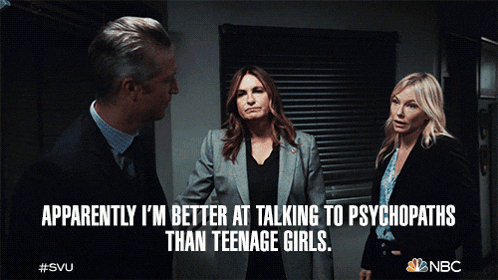How to Talk (and Listen!) About Online Safety: Teen-Approved Tips for Parents
I don’t think a blog post goes by where I am not advising parents to have open & honest communication with their children, so I thought maybe I should write something about how best to do that. Over the years I have been doing this, I have spoken to numerous parents and teachers on various areas of online safety, more importantly though, I have spoken to the children themselves and have accrued a little bit of knowledge that could help you with those discussions.
Nobody will ever fully decode the brain of a teenager, though, so this advice should be used in conjunction with your judgment and knowledge of your children.
⚡Please don’t forget to react & restack if you appreciate my work. More engagement means more people might see it. ⚡
Setting the Stage: How to Approach the Conversation
Before diving into specific topics, it is important to consider how you approach the conversation. Here are my top tips:
Be Curious, Not Critical: Approach the conversation with an open mind. Remember that children and teenagers interact with the internet very differently from how we as adults do, and being judgmental can make your child reluctant to share with you now and in the future.
Embrace the Positives: Show that you also understand there are many benefits to being online. For instance, you could share a funny video you found or ask them about something interesting they've discovered online, which shows you value their interests and have a genuine interest in them.
Stay Calm, Don't Overreact: It's important to remain calm and genuinely listen to what your child has to say. This fosters a comfortable environment for them to share their thoughts now and in the future. This will probably be a very difficult one for some, but if you want to stand a chance that they won’t hide things from you, it is a very important one.
Share Your Own Stories: When parents talk about their online activities, it creates an open space for teens to share what they're doing online too. Many of them are often surprised to hear that we were once young ourselves, so surprise them with how interesting you were!
Discover the Internet Together: The internet plays a vital role in their young lives, and showing interest in their online world can break down communication barriers. You could ask them to teach you how to use a social media app or find information you're interested in; many of you will be surprised at just how much they know.
Keep it Relevant: As your child grows, their internet use, its purpose, and the challenges they face will evolve, so your conversations should too and I will always be here to try and help you stay relevant, well in the respect of trends, I can’t make you stay trendy to them :)
Kickstarting the Conversation
The following are some ideas for conversation starters, which I have researched for you using my amazing Google-Fu skills, try it for yourselves too.
"Who is your favourite influencer on social media, or what is your favourite online game?" Starting with an easy question about what they like online can make your child or teenager feel comfortable and serve as a trigger for deeper discussions.
"What did you think of the recent story about [sports team/celebrity/influencer that your teenager is interested in]?" Talking about recent news or trending online topics is a natural way to ease into a conversation and find common ground.
"Can you show me how your favourite app/game works?" Showing interest in what your child or teenager enjoys online encourages them to be more open with you. It also helps you learn and gain a better understanding of their online activities. You might be surprised to find you are similar in some ways.
"How do you stay connected with your friends online?" The social aspect of being online is a lifeline to many young people, allowing them to stay connected with friends and communities globally. Understanding this social element helps you support them in having a safe and positive online experience.
"What app do you use the most, and if you didn’t use the app, how would it affect you?" This helps your child evaluate the pros and cons of their online activities and identify potential support needs.
"Expectation versus the Reality: This is how I think you spend your time online…" What parents think their teenager does online often differs from reality. Many teens can get frustrated when parents make assumptions about their online experience, so having an open conversation and truly listening is valuable. Remember, we never assume, because it makes an ASS out of U and ME ( I will use any opportunity to get that one in there as I learned it very early on in my police career).
"OK, let’s switch roles… What advice could you give me about being better online?" This approach can be a helpful bridge to discussions about online safety, responsible technology use, and positive internet habits. It also reminds you to lead by example and follow the rules yourself.
"What rules do you think we should have in place about using the internet?" Establishing family rules and guidelines for online behaviour is helpful. By allowing your child to contribute to developing these rules, this can lead to better understanding and acceptance of the guidelines. It’s always good to revisit these rules from time to time and update them.
By talking to your children about their online lives just as you would about their offline lives, you make it more likely that they will feel comfortable coming to you if they encounter anything that bothers them online.
Hopefully this has been useful to you, feel free to share it on your own social media accounts and as always, reach out to me with any questions, comments or suggestions.
As always, thank you for your support. Please share this across your social media, and if you do have any comments, questions, or concerns, then feel free to reach out to me here or on BlueSky, as I am always happy to spend some time helping to protect children online.
Remember that becoming a paid subscriber means that you will be supporting two charities that are very close to my heart and doing amazing things for people. The Not Forgotten Association and Childline, as I will split all subscriptions 50/50 and donate to each charity every six months, as I don’t do any of this for financial gain.






About that…. Not many people really know how and when to listen and just cannot shut up.
Good and informative article.
Great advice! In a perfect complement to the article I am posting this week where I give an example of how a family lost $50,000 because of something that one of the children posted on social media.
@cyberphil